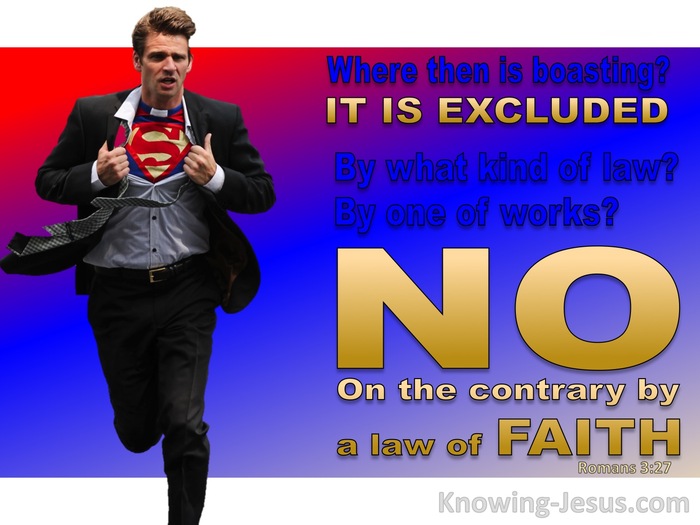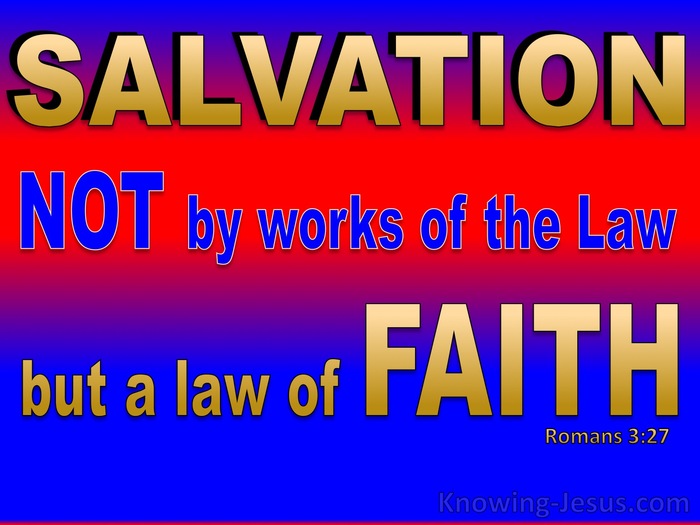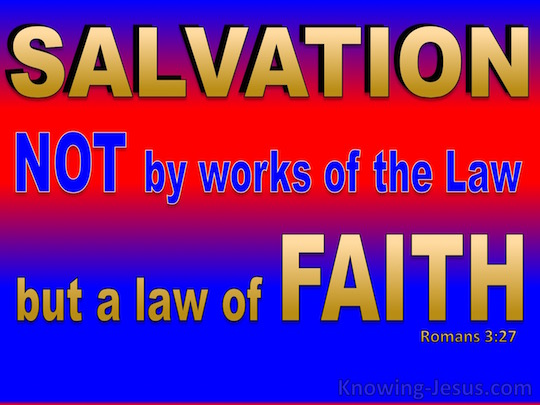Parallel Verses
New American Standard Bible
Where then is
King James Version
Where is boasting then? It is excluded. By what law? of works? Nay: but by the law of faith.
Holman Bible
Where then is boasting?
International Standard Version
What, then, is there to boast about? That has been eliminated. On what principle? On that of actions? No, but on the principle of faith.
A Conservative Version
Where then is the boasting? It is excluded. By what law, of works? No, but by a law of faith.
American Standard Version
Where then is the glorying? It is excluded. By what manner of law? of works? Nay: but by a law of faith.
Amplified
Then what becomes of [our] boasting? It is excluded [entirely ruled out, banished]. On what principle? On [the principle of good] works? No, but on the principle of faith.
An Understandable Version
Where then is the [basis for] boasting [i.e., over being right with God]? There is not any. Is it by [obedience to] a law? Is it by doing certain deeds? Not at all, but by a law of faith.
Anderson New Testament
Where, then, is boasting? It is excluded. By what law? Of works? No; but by the law of faith.
Bible in Basic English
What reason, then, is there for pride? It is shut out. By what sort of law? of works? No, but by a law of faith.
Common New Testament
Where then is our boasting? It is excluded. On what law? On the law of works? No, but on the law of faith.
Daniel Mace New Testament
what reason then is there for boasting? it is excluded. what, by the ceremonial law? no: but by the law of faith.
Darby Translation
Where then is boasting? It has been excluded. By what law? of works? Nay, but by law of faith;
Godbey New Testament
Then where is boasting? It is excluded. By what law? of works? No; but by the law of faith.
Goodspeed New Testament
Then what becomes of our boasting? It is shut out. On what principle? What a man does? No, but whether a man has faith.
John Wesley New Testament
Where is boasting then? It is excluded. By what law? Of works?
Julia Smith Translation
Where then boasting? It was excluded. By what law? of works? No: but by the law of faith.
King James 2000
Where is boasting then? It is excluded. By what law? of works? Nay: but by the law of faith.
Lexham Expanded Bible
Therefore, where [is] boasting? It has been excluded. By what kind of law? Of works? No, but by a law of faith.
Modern King James verseion
Then where is the boasting? It is excluded. Through what law? Of works? No, but through the law of faith.
Modern Spelling Tyndale-Coverdale
Where is then thy rejoicing? It is excluded. By what law? By the law of works? Nay: but by the law of faith.
Moffatt New Testament
Then what becomes of our boasting? It is ruled out absolutely. On what principle? On the principle of doing deeds? No, on the principle of faith.
Montgomery New Testament
Then what becomes of boasting? It is shut out. What sort of law forbids it? A law of works? No, but a law of faith.
NET Bible
Where, then, is boasting? It is excluded! By what principle? Of works? No, but by the principle of faith!
New Heart English Bible
Where then is the boasting? It is excluded. By what manner of law? Of works? No, but by a law of faith.
Noyes New Testament
Where then is the boasting? It is excluded. By what law? of works? Nay; but by the law of faith.
Sawyer New Testament
Where then is the boasting [of the Jew]? It is excluded. By what law? Of works? No; but by the law of faith.
The Emphasized Bible
Where, then, the boasting! It is excluded. Through what kind of law? Of works? Nay! but through a law of faith:
Thomas Haweis New Testament
Where then is boasting? It is excluded. By what law? of works? No: but by the law of faith.
Twentieth Century New Testament
What, then, becomes of our boasting? It is excluded. By what sort of Law? A Law requiring obedience? No, a Law requiring faith.
Webster
Where is boasting then? It is excluded. By what law? of works? No; but by the law of faith.
Weymouth New Testament
Where then is there room for your boasting? It is for ever shut out. On what principle? On the ground of merit? No, but on the ground of faith.
Williams New Testament
So where has human boasting gone? It was completely shut out. On what principle? On that of doing something? No, but on the principle of faith.
World English Bible
Where then is the boasting? It is excluded. By what kind of law? Of works? No, but by a law of faith.
Worrell New Testament
Where, then, is the boasting? It was excluded. By what manner of law? Of works? Nay; but by a law of faith.
Worsley New Testament
Where then is boasting? it is excluded: by what law? of works? no: but by the law of faith.
Youngs Literal Translation
Where then is the boasting? it was excluded; by what law? of works? no, but by a law of faith:
Themes
Interlinear
Dia
Dia
References
Word Count of 37 Translations in Romans 3:27
Prayers for Romans 3:27
Verse Info
Context Readings
Boasting Excluded
26
It showed his righteousness at this present season that he might himself be righteous, and the justifier of he who has faith in Jesus.
27 Where then is
Cross References
Romans 2:23
You who boast in the law do you by transgression of the law dishonor God?
Romans 4:2
If Abraham was declared righteous by works, he could boast, but not to God.
1 Corinthians 1:29-31
No human being should boast before God.
Romans 2:17
If you are a Jew in name and are resting on the law and taking glory in God,
Ezekiel 16:62-63
I will renew my covenant with you, and you will know that I am Jehovah.
Ezekiel 36:31-32
Then you will remember your evil ways and the bad things that you did. You will hate yourselves for all these wicked and disgusting things.
Zephaniah 3:11
At that time you will no longer be ashamed of your transgression against me. I will remove everyone who is proud and arrogant. You will never again be haughty on my holy mountain.
Mark 16:16
He who believes and is baptized will be saved. He who does not believe will be condemned.
Luke 18:9-14
He then spoke this illustration to some who trusted in themselves. They were very self-righteous. They looked down on others:
John 3:36
He who puts active faith in the Son has everlasting life. He who disobeys* the Son will not see life for the wrath of God remains upon him. (*Greek: apeitheo: willfully disobey, not having faith)
Romans 3:19
We know that whatever the law says, it speaks to those under the law. Every mouth may be stopped and the entire world may become liable to God for punishment.
Romans 7:21
I find that this law is at work. When I want to do what is good, what is evil is the only choice I have.
Romans 7:23
However I see a different law at work in my body. This law fights against the law that my mind approves of. It makes me a prisoner to the law of sin that is at work in my body.
Romans 7:25
Thanks to God, through our Lord Jesus Christ! So then I can serve God's law only with my mind, while my human nature serves the law of sin.
Romans 8:2
The law of the Spirit gives us life through (with) (because of) Christ Jesus. It has set me free from the law of sin and death.
Romans 9:11
When they had not yet been born nor performed anything good or vile, so the purpose of God regarding the choosing would continue without dependence on works but on the One who calls.
Romans 9:32
Why? It is because it was not based on the principle of faith, but on that of works. They have stumbled at the stumbling stone.
Romans 10:5
Moses writes down the righteousness that is of the law. The man who has practiced those things shall live by them.
Romans 11:6
If it is by grace then it is no longer on the basis of works. Otherwise grace is not grace (undeserved kindness). But if it is of works then it is not by grace. Otherwise works are no longer works.
1 Corinthians 4:7
For who made you superior to (different than) another? What do you have that you did not receive? If you did receive it, why do you brag, as if you did not receive it?
Galatians 2:16
Yet we know that a man is not righteous by the works of the law, but through faith in Jesus Christ. We believed on Christ Jesus, that we might be righteous by faith in Christ, and not by the works of the law. The works of the law justify no one.
Galatians 3:22
But the Scriptures shut up (imprisoned) (pictured) all things (mankind) under sin, that the promise by faith in Jesus Christ might be given to those who believe.
Ephesians 2:8-10
By grace (Greek: charis, divine favor, loving-kindness) you have been saved through faith. It is not from you. It is the gift from God!
1 John 5:11-12
The testimony is this that God gave us everlasting life and this life is in his Son.






